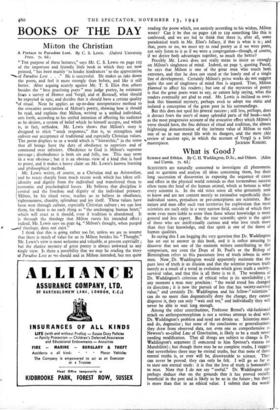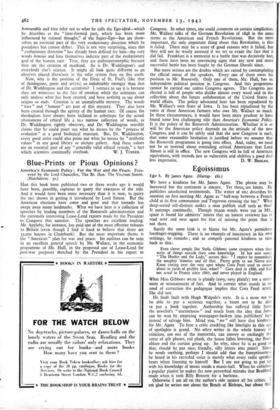What is Good ?
SCIENTISTS are naturally concerned to investigate all phenomena and to question and analyse all ideas concerning them, but their long succession of discoveries in exposing the sequence of cause and effect in the physical world reminds us that tremendous success often turns the head of the human animal, which at bottom is what every scientist is. In the old strict sense all who genuinely seek to know and are not content merely to rationalise superficially their individual tastes, prejudices or pre-conceptions are scientists. But nature and man offer such vast territories for exploration that most scientists are such only in a very narrow field, outside of which they seem even more liable to error than those whose knowledge is more general and less expert. But the true scientific spirit is the spirit of those who are intellectually curious and who love truth more than they fear knowledge, and that spirit is one of the finest of human qualities.
In saying this I am begging the very question that Dr. Waddington has set out to answer in this book, and it is rather amusing to discover that not one of the eminent writers contributing to this symposium, not even the Dean of St. Paul's or the Bishop of Birmingham refers to this passionate love of truth inborn in some men. Now. Dr. Waddington would apparently maintain that the pure love of truth is an illusion and that the scientist pursues truth merely as a result of a trend in evolution which gives truth a society- survival value, and that this is all there is to it. The weakness of Dr. Waddington's criterion of ethical value is its unreliability ; at any moment a man may proclaim: " the social trend has changed its direction ; it is now the pursuit of lies that has society-survival value," and certainly Dr. Waddington and his fellow-" scientists " can do no more than dogmatically deny the change, they cannot disprove it, they can only "wait and see," and individually they will never be able to wait long enough.
Among the other contributions, Professor Bernal's old-fashioned attack on anthropormorphism is not a serious attempt to deal with Dr. Waddington's problem and need not detain us. Scientists must, and do, dogmatise ; but none of the conclusions or generalisations they draw from observed data, not even one as comprehensive as Newton's so-called Law of Gravitation, is likely to be a truth never needing modification. That all things are subject to change is Dr. Waddington's argument (I commend to him Spenser's stanzas on Mutabilitie) ; but though there may be no complete truths, I suggest that nevertheless there may be eternal truths, but that none of these eternal truths is, or ever will be, discoirerable to science. They can never be proved, they can only be felt. I will go so far as to state one eternal truth : it is that the love of truth is honourable to man. Note that I do not say " useful." Dr. Waddington can perhaps deduce that on the grounds that it has proved socially beneficial in the past and is likely to be so in the future ; but there is more than that in an ethical value. I submit that the words honourable and love refer not to what he calls the Ego-ideal—which he describes as the " later-formed part, which has been more influenced by rational thought," of. the. Super-Ego—but are them- selves an essential part of the very evolutionary direction which he postulates but cannot define. This is not very surprising, since this " evolutionary direction " has already been defined for him—the very words honour and love themselves indicate part of the evolutionary goal of the human race. True, they are anthropormorphic because they are the creation of mankind. So is Dr. Waddington's and everybody else's science. It might all look quite different to an observer placed elsewhere in the solar system than on this earth.
Now, why is the position of the Dean of St. Paul's (like that of theologians, poets and artists) so indubitably stronger than that of Dr. Waddington and the scientists? I venture to say it is because they are witnesses to the fact of creation while the scientists can only analyse what has been created, and have nothing to say about origins or ends. Creation is an unanalysable mystery. The words " love " and " honour " are part of this mystery. They also have been created through the agency of the human race. Of course the theologians have always been inclined to substitute for the actual phenomena of ethical life a ton narrow collection of words, as Dr. Waddington rightly observes, and Dr. Waddington sensibly claims that he could point out what he means by the " process of evolution " at a good biological museum. But, Dr. Waddington, every good artist could also point out what he means by " aesthetic values " in any good library or picture gallery. And these values are an essential part of any " generally valid ethical system," a fact
which scientists continually overlook. W. J. TURNER.



























 Previous page
Previous page